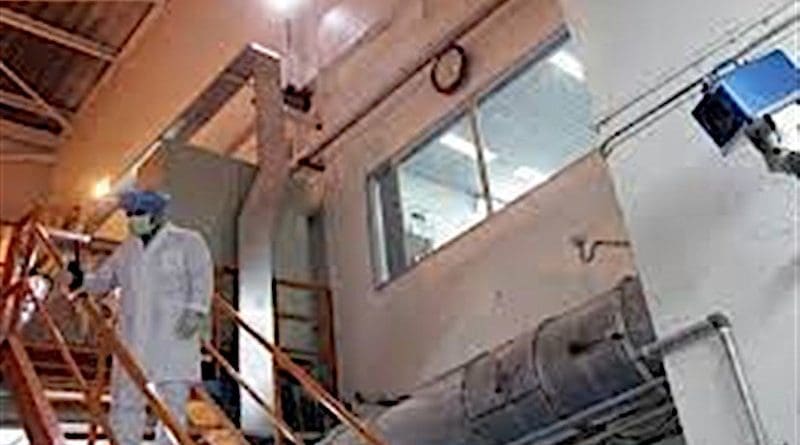Iran, UN Atomic Agency Agree On Reinstalling Damaged Cameras At Nuclear Site
By RFE RL
(RFE/RL) — Iran and the UN’s nuclear watchdog have announced an agreement on replacing damaged cameras at an Iranian nuclear complex amid Western warnings that talks with Tehran on reviving a 2015 nuclear deal were “rapidly reaching the end of the road.”
The Vienna-based International Atomic Energy Agency (IAEA) had been seeking to replace the cameras, one of which Iran claims was damaged in a June attack that it blames on Israel.
The IAEA “will soon install new surveillance cameras at Iran’s Karaj centrifuge component manufacturing workshop under an agreement reached today by Director-General Rafael Mariano Grossi and the Head of the Atomic Energy Organization of Iran, Mohammad Eslami,” an IAEA statement said on December 15, calling this “an important development.”
It added that the two sides “will continue to work on remaining outstanding safeguards issues with the aim of resolving them.”
The IAEA has sought the monitoring of activities at the centrifuge-parts-production site near Karaj that was hit by the alleged Israeli act of sabotage.
Iran said one of four IAEA cameras there was destroyed in the attack, and it later removed all the cameras.
Tehran has refused to allow the IAEA access, citing an ongoing investigation into the incident.
“In a gesture of goodwill, Iran is allowing the IAEA to install new cameras to replace those damaged in a sabotage operation” against the Karaj nuclear site, said Iran’s Nour news agency, which is seen as close to the Islamic republic’s Supreme National Security Council.
“This is a voluntary action by Iran to end misunderstandings in its relations with the IAEA,” it said.
The breakthrough came a day after Britain, France, and Germany — the three European powers that are part to the agreement together with China and Russia — said that talks with Iran to revive the 2015 nuclear deal are “rapidly reaching the end of the road.”
The comments suggest talks between Iran and the remaining parties to the agreement are nearing collapse some two weeks after they resumed in Vienna after a five-month hiatus, with the United States participating indirectly.
The 2015 Joint Comprehensive Plan of Action (JCPOA), under which Iran curtailed its nuclear activities in exchange for the lifting of global sanctions, began unraveling in 2018 when former U.S. President Donald Trump pulled out of the deal and reimposed sanctions, prompting Tehran to gradually exceed limits imposed under the pact.
Trump’s successor, Joe Biden, says the United States is ready to rejoin the JCPOA provided Iran resumes observing the deal’s conditions.
The remaining parties to the deal are holding their seventh round of talks in Vienna, but no apparent progress has been made due to what Western officials say is Tehran’s reneging on compromises reached in the previous six sessions. Iran’s new positions and demands come after hard-line cleric Ebrahim Raisi was elected president in June.
Considerable gaps remain between Iran and the other parties over the speed and scope of sanctions relief and technical aspects of how and when Iran will reverse its nuclear steps.
Iran is demanding the lifting of all U.S. sanctions in a verifiable process. Washington has said it would remove sanctions “inconsistent” with the JCPOA if Iran resumed compliance, but there are questions over how the Biden administration can remove the Trump-imposed sanctions.
The United States has also implied that sanctions on Iran for terrorism or human rights abuses would remain in place.

